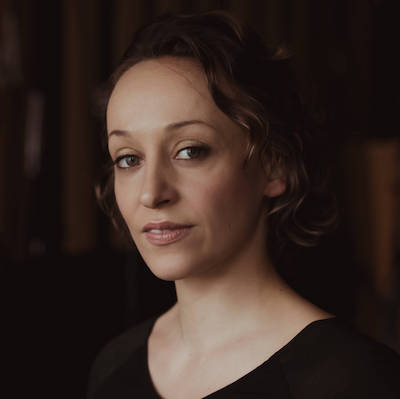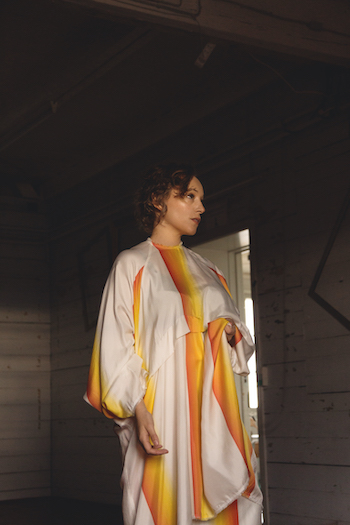Light, Console Me is a new composition from renowned British singer-songwriter Ana Silvera. The piece, which also features Gambian kora master Sefo Kanuteh, is available now on Bandcamp and other streaming platforms. What was initially planned as a track-by-track guide to the release led to this more personal and insightful article from Ana.

If I’m to tell you the story of how Light, Console Me came to be, I’d have to start with the call from Daisy*. It was March, early COVID days. The world had suddenly been tipped upside down, its contents spilling out around us, its new and strange clatter reverberating in our ears.
Daisy asked whether I’d be interested in writing a piece for myself and Gambian kora master Sefo Kanuteh that reflected on the Mourner’s Kaddish – an Aramaic prayer from the Jewish tradition. I was to create something that meditated on these themes of grief and sadness – relevant, given what was unfolding in our midst.
But there was also something that personally resonated with me about this commission. For a long time, I’d wanted to write a piece about the ways we mourn, the ways we remember the dead. Like many artists, grief is one of the base metals that I transmute into song and this alchemy has been my means of psychic survival over the years, in the face of intense loss.
I think of the elephants who revisit the resting place of the matriarch, taking turns to touch and stroke the skeleton and forming their own kind of wake. The Indonesian tribe who exhume their loved ones’ bodies once a year, pop a favourite sunhat on their head or slide a cigarette between their lips and take them for walks through the village. (I like that, so joyous).
The rabbi who cut the silk scarf I wore around my neck at my mother’s burial over a decade ago, a ritual gesture that deftly acknowledged the rage and pain of bereavement. The rocks or flowers we place on the grave, X marks the spot.
I turned all these ideas over in my mind as the lockdowns, closed borders, infection rates and death counts rose.
There’s a term coined by therapist Pauline Boss – ‘ambiguous loss’, which can refer to instances where there is a physical body but no one recognisable inhabiting it any longer (as in dementia) but also situations where the physical body itself is missing, and the peculiar agony of that predicament for those left behind.

I think of those relatives of the ‘desaparecidos’ – those who were disappeared during Pinochet’s regime – sifting through the sand of the Atacama desert, patiently unearthing the bleached bones of their fathers, daughters, grandparents. Extraordinary that the dead must be recovered to allow the living to recover from the death of them.
Or the story of my Ugandan friend kidnapped by the Lord’s Resistance Army, whose family wrapped a banana stem in a white cloth tall as a man and buried it, believing he was gone.
A pile of bones, a severed shoot, a pebble, a torn up cloth.
It seems that it runs deep in us, the need to turn what is so incomprehensible, huge and ungraspable into something tangible: a moment, an act, an object.
And we need the physical weight of that death, even if it is a stand-in, and even if we eventually burn, submerge, bury or embalm them after.
As the weeks went by, slowly the work found it’s own feet, and tongue. I listened to other artists’ versions of or responses to the Kaddish: everything from the Hasidic Kaddish sung by a New York cantor, to Ravel, Barbara Streisand, Yemeni-Israeli diva Ofra Haza and of course, the wonderful Leonard Cohen – one of his final songs, You Want It Darker references the Kaddish in many interesting ways. (“You’re dying, but you don’t have to cooperate so enthusiastically with the process,” Leonard Cohen told The New Yorker a few years before his death between cigarettes and tequila. Legend).
The first song arose from an image of a hospital room giving way to a vast sky. I was seeing through the eyes of the patient, longing to give up the fight but held back by the memory of the ones they’d leave behind (Movement I: Departing). For the second song, I found myself in the shoes of that loved one, pacing up and down the hallway waiting for news (Movement II : Awaiting). And for the third and final song (based on a beautiful folk song from Sefo’s tradition), I was one among a congregation of many (‘oh these nights, we have cursed and we have cried/Tangled in the reeds before we’re swallowed by the sky’), finding comfort in the collective experience.
Later, Liv, who created the visuals for Light, Console Me, suggested we shoot an hour south of Copenhagen (where I’ve been for the COVID duration) to an old limestone mine, Faxe Kalkbrud. The night before, I read that this mine was, 63 million years back, a huge web of coral, a sea bed one hundred metres under the ocean that teemed with tropical life. And as we shot, the only sound other than the stormy wind, was of children chipping and chiseling the remains of these sea creatures – urchins, crabs, snails, ammonites, mosasaurs – who died longer ago than we can even begin to fathom. It seemed kind of apt.
I hope these songs provide comfort, space to reflect, maybe even take the listener momentarily to another world.
Ana Silvera
Order Light, Console Me via Bandcamp: https://anasilvera.bandcamp.com/album/light-console-me
*Daisy Lees is the head of arts organization, Arts La’Olam.
‘Light, Console Me’ is a #betweenspaces commission from Arts La’Olam supported by Arts Council England.
Photo Credit: LA Ikkala
